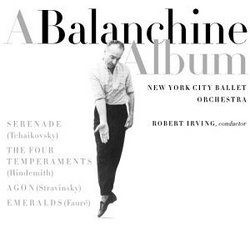| All Artists: Pyotr Il'yich Tchaikovsky, Paul Hindemith, Igor Stravinsky, Gabriel Faure, Robert Irving, New York City Ballet Orchestra, Gordon Boelzner Title: A Balanchine Album Members Wishing: 0 Total Copies: 0 Label: Nonesuch Release Date: 5/28/1992 Genre: Classical Styles: Ballets & Dances, Ballets, Forms & Genres, Concertos, Serenades & Divertimentos, Historical Periods, Classical (c.1770-1830), Modern, 20th, & 21st Century, Symphonies Number of Discs: 2 SwapaCD Credits: 2 UPC: 075597913521 |
Search - Pyotr Il'yich Tchaikovsky, Paul Hindemith, Igor Stravinsky :: A Balanchine Album
 | Pyotr Il'yich Tchaikovsky, Paul Hindemith, Igor Stravinsky A Balanchine Album Genre: Classical
|
Larger Image |
CD Details |
CD ReviewsA lesson on Balanchine's musicality ATP | Santa Monica, CA United States | 06/25/2003 (5 out of 5 stars) "This album shows why Balanchine had a well-deserved reputation for musicality. Consider Serenade: by re-arranging the movements of Tchaikovsky's Serenade in C, Balanchine ended his ballet with the lyrical "Elegy" instead of the composer's Finale. That's one of the reasons Serenade is plotless, but never meaningless: the Elegy has an emotional resonance that always moves me to tears. And it's even more effective after the energy of the "Russian" Finale. The music for the Emeralds section of Jewels is woven from two entirely different Faure pieces: Pelleas and Melisande, and Shylock. In Balanchine's hands, the Faure music is wonderfully liquid and absolutely seamless. Balanchine's method of combining different pieces by the same composer is completely unlike the crazy quilts created by 19th century ballet masters - the music credits for Le Corsaire sound like a law firm, Adam, Delibes, Drigo, Pugni and I don't know who else. If you enjoy ballet, this album is good listening, and a fascinating lesson in the way Balanchine used music." A tribute to the unsung Robert Irving Santa Fe Listener | Santa Fe, NM USA | 05/15/2007 (4 out of 5 stars) "The reviewer below assumes that this double CD is about Balanchine, but really that's jsut a commerical hook. All the music belongs with famous Balanchine ballets, but we cana't see any dancing, so the focus is actually conductor Robert Irving, who was in the pit for much of Balanchine's heyday (Irving died in 1991). These reissued analog recordings with the New York City Ballet Orchestra sound veyr good. You won't mistake this ensemble for a great orchestra; it's fairly small and plays with neat professionalism rather than virtuosity.
And Irving himself was a modest interpreter of the works heard here. Some are easy to condcut--Tchaikovsky's Serenade for Strings, the two Faure works--while Agon, Stravinsky's late serial masterpiece, is very difficult. Don't expect Irving's quiet readings to be definitive, but in their springy, alert way they bring the whiff of ballet into your listening room. I recently saw Balanchine's great Four Temperament ballet, and hearing the music again under Irving brought back many vivid stage pictures. I think other lovers of Balanchin'es art will have the same nostaligc experience." |

 Track Listings (9) - Disc #1
Track Listings (9) - Disc #1